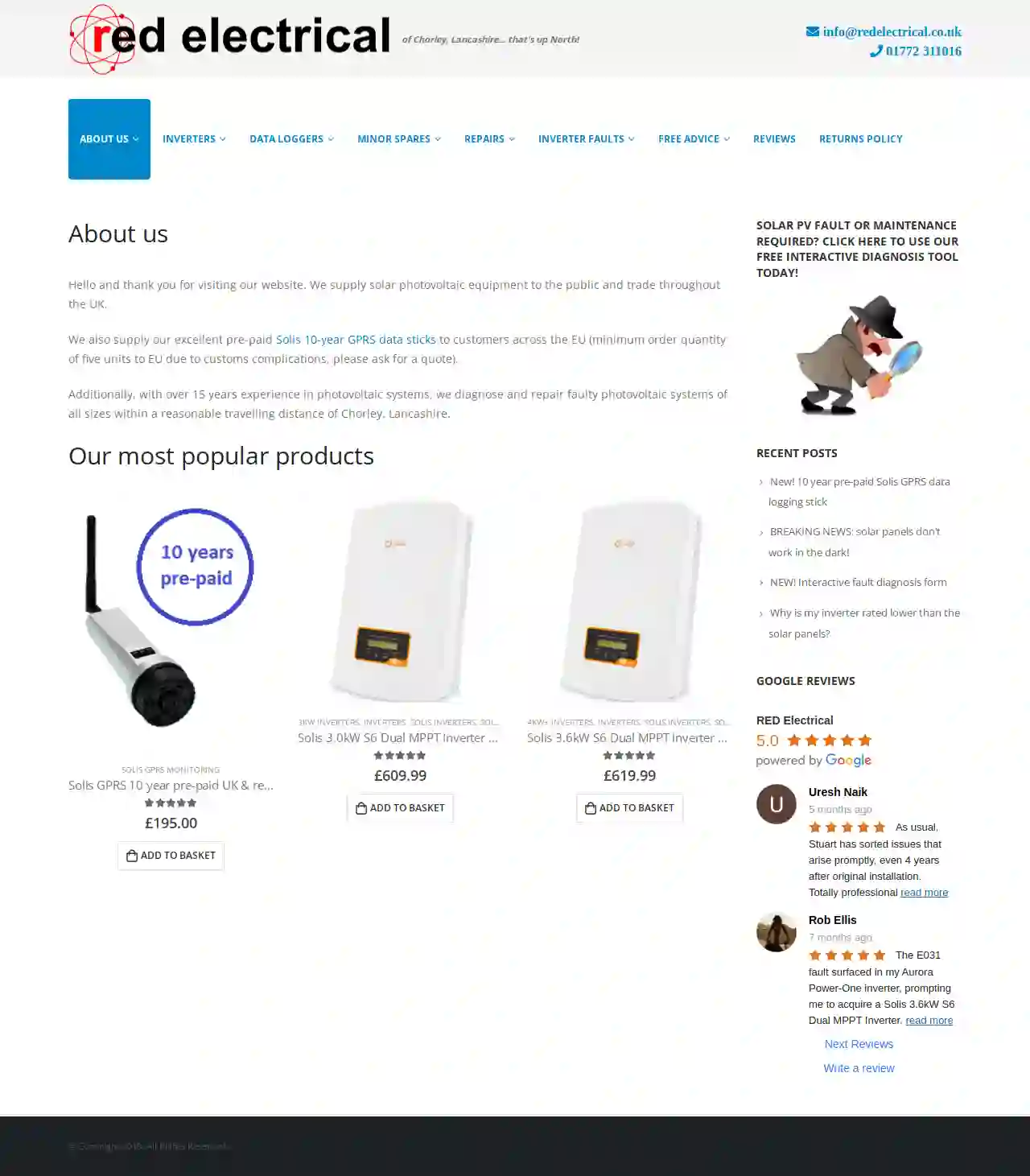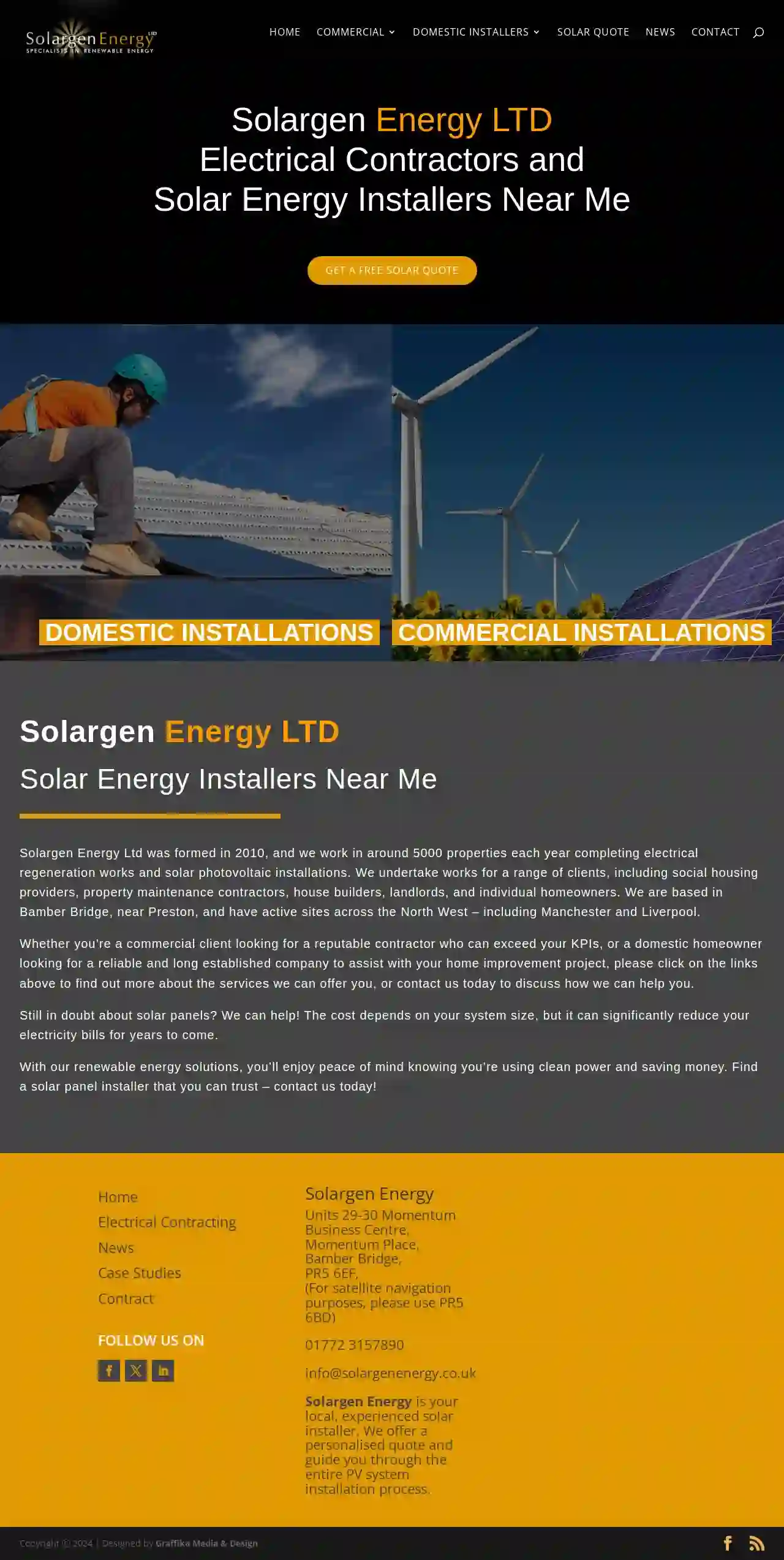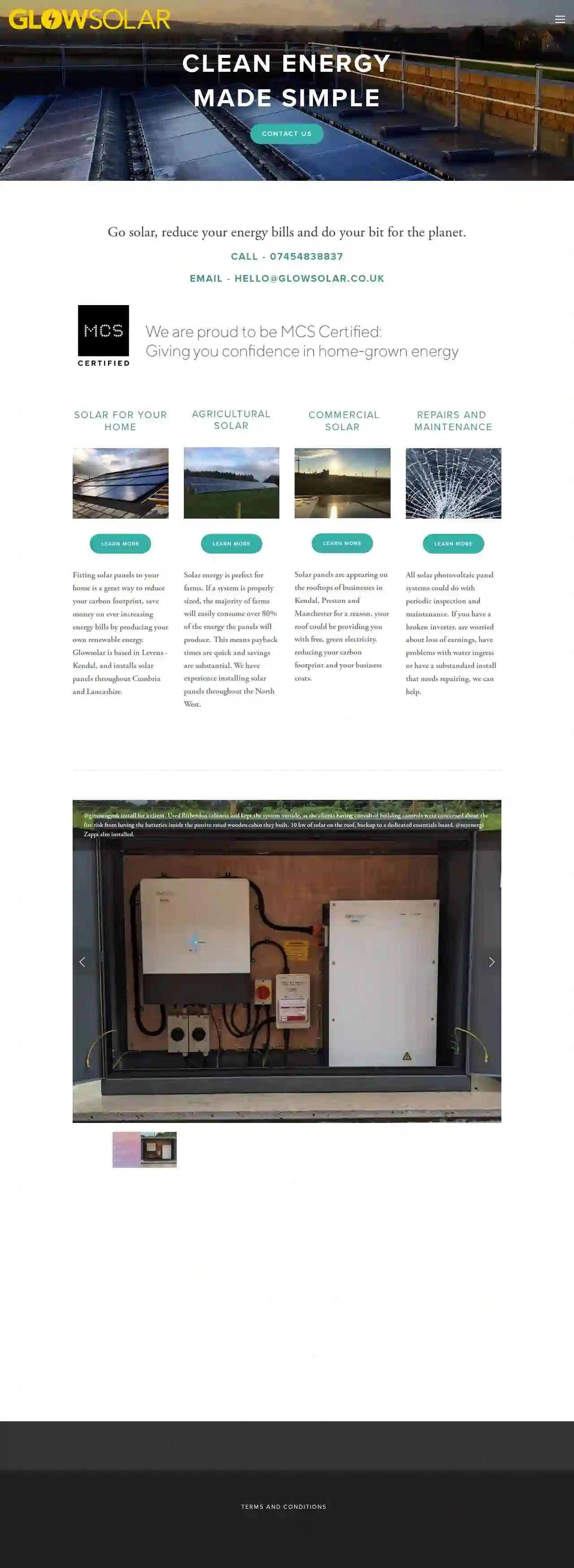Solar Installers Bamber Bridge
Best Solar Installers Near Me in Bamber Bridge
Receive up to 3 Solar Installer quotes for your project today! Compare profiles, reviews, accreditations, portfolio, etc... and choose the best offer.

QPG Energy
Chorley, GBQPG Energy provides businesses and homeowners with a no-fee, renewable energy procurement service. Our experienced team of industry experts will find you the best green energy deals on the market and even negotiate bespoke energy contracts. We’ll also find you the most energy-efficient technologies, including on-site energy generation solutions. Get your free quote! QPG ENERGY –Your First Choice Green Energy Consultant
- Services
- Why Us?
- Accreditations
- Our Team
- Gallery
Get Quote
RED Electrical
5108 reviewsChorley, GBHello and thank you for visiting our website. We supply solar photovoltaic equipment to the public and trade throughout the UK. We also supply our excellent pre-paid Solis 10-year GPRS data sticks to customers across the EU (minimum order quantity of five units to EU due to customs complications, please ask for a quote). Additionally, with over 15 years experience in photovoltaic systems, we diagnose and repair faulty photovoltaic systems of all sizes within a reasonable travelling distance of Chorley, Lancashire.
- Services
- Why Us?
- Our Team
- Testimonials
- Gallery
Get Quote
Go Green Solar Group Ltd
521 reviewsOaklea, Over Kellet, Lancashire, LA6 1DN, GBGo Green Solar Group Ltd is a leading supplier and installer of solar PV panels for both residential and commercial properties. Based in the North West of England, we are fully accredited, professional solar PV panel installers and solar PV panel suppliers, servicing clients and providing our high-quality Go Green solar panels throughout the UK. Our directors have 15 years of extensive knowledge of the energy industry between them. Go Green Solar Group, therefore, offer an exceptional service in designing, installing, testing, and maintaining your solar PV panels. As the North West’s number one solar panel suppliers, you should choose us for your residential or commercial solar panel installation. Our mission at Go Green Solar Group Ltd is to provide environmentally friendly energy-saving solutions to homes and businesses of all sizes, covered by a performance warranty, all with the necessary accreditations.
- Services
- Why Us?
- Accreditations
- Gallery
Get Quote
Contact Solar
4.9555 reviewsUnit 15 Matrix Way, Buckshaw Village, Preston, PR7 7ND, GBAt Contact Solar, we are a leading national company specializing in solar panel and battery storage installations across the UK. We pride ourselves on providing exceptional customer service, from our no-pressure sales approach to our dedicated in-house technical support team. Our mission is to empower our customers with the knowledge and solutions they need to make informed decisions about their solar energy investments. We understand that choosing a solar panel system is a significant decision, and we are committed to guiding you every step of the way. Our team of experts takes the time to listen to your individual needs and design a customized system that maximizes your energy savings and return on investment. We work with trusted manufacturers like Sunsynk, Jinko, and JA Solar to offer high-quality products backed by extended warranties. We are proud to be a No.1 rated company on both Trustpilot and Google, with over 10 years of experience in the industry. Contact us today for a free quote and let us help you harness the power of the sun!
- Services
- Why Us?
- Accreditations
- Gallery
Get Quote
INSTALL SOLAR PANELS
515 reviewsAstley Lodge, Queens Road, Suite 3, Chorley, PR7 1JU, GBInstall Solar Panels Ltd are the North West's number one solar installation company, with successful installs throughout Lancashire, Merseyside, Cheshire and Greater Manchester. The installation of solar power systems is becoming a must for domestic properties. Our qualified Solar Engineers assess the unique requirements of your property with a free, no-obligation quote, ensuring the correct solar panels, inverters and batteries are installed in your home.
- Services
- Why Us?
- Accreditations
- Our Team
- Testimonials
- Gallery
Get Quote
Nightingale Energy - Solar Panel Installation
515 reviewsSt Andrews Place, Hill Lane, St Andrews Place Hill Lane, Bolton, BL6 5JW, GBSolar Panel Services across the North West & UK A Division of Nightingale Electrical (Bolton) Ltd Get Free Estimate Solar Panel Installation and Maintenance in the UK Since 2011, Nightingale Energy has been providing solar panel installation and maintenance across the UK's North West, including Bolton, Wigan, Chorley, and Manchester. As energy costs rise, solar panels are an effective way to reduce bills and promote eco-friendly living. Our expert team offers comprehensive services from design to maintenance. Contact us to learn more or discuss solar solutions for your home or business. About Us Our Services We are dedicated to providing homes and businesses across the North West with a variety of renewable energy solutions. If you’d like to find out more about any of our services listed below, please don’t hesitate to give us a call on 01204 325177. Solar Inverter Replacement If you believe that your existing solar PV is underperforming, our team of solar energy specialists is on hand to provide inverter replacements across the North West and the UK! Find Out More Battery Storage Our team of specialists are here to advise on the best location to install your battery storage system which will capture the electricity that is generated from your solar panels. Find Out More SolarEdge Upgrade SolarEdge upgrades are now available to ensure you are getting maximum performance from your solar panels, including the ones in more shaded areas. Find Out More Solar Panel Installation To upgrade your home’s energy system to solar renewable energy, start discussing your options with Nightingale Energy today. Find Out More Maintenance and Servicing Should any problems occur with your solar panels, Nightingale Energy are here to provide any maintenance and servicing you should need to ensure they are working to their full potential. Find Out More Solar Panel Pest Control If you’ve noticed birds (often pigeons) nesting within your solar panels, this can cause smells, an excess of droppings and noise on your roof area, and can be a real nuisance. Our team are available to provide pest proofing for your solar panels, helping you alleviate the problem. Find Out More Car Charger Installation An electric car is a great way to start living more eco-friendly. To install your solar-powered car charger for your North West home, give our team a call today. Find Out More How We Serve We can talk you through the basics to fault find the issue and recommend the best solution, or you can book a visit with one of our engineers to investigate the errors for you.Warranty We are proud to be part of the team of award-winning solar panel installers who by installing a 50kW Solar PV System at Bodnant Gardens, which won 1st Place in Solar Installation of the Year.
- Services
- Why Us?
- Gallery
Get Quote
Solarguard UK
46 Lonsdale Drive, Croston, PR26 9SB, GBSolarguard UK is a family-run business dedicated to providing comprehensive solar panel protection solutions. We understand the importance of both aesthetics and functionality for homeowners and installers, offering a range of products and services to ensure optimal performance and prevent pest-related issues. Our team is committed to providing personalized service and expert advice, tailoring solutions to each customer's unique needs. We offer two exceptional Solar Panel Guard solutions: the Aesthetic Solution, meticulously crafted to maintain the visual appeal of private properties, and a more simplistic option for commercial or industrial clients where functionality takes precedence. At Solarguard UK, we believe in safeguarding your solar investment for the long haul, ensuring your panels remain bright, clean, and high-performing for years to come.
- Services
- Why Us?
- Gallery
Get Quote
EMBS Limited
Electrical Mechanical Building Services Limited, GBAt EMBS we are proud to offer specialised installation services in all aspects of the electrical industry. We have extensive experience company wide whether that be; install, fault finding and repair, inspection and testing, or EV charger installation. At EMBS, we work as a team to ensure we meet the client's expectation of any project. We carry out all aspects of electrical installation, repair, testing and inspection for our clients and take on jobs of all sizes.
- Services
- Why Us?
- Gallery
Get Quote
Solargen Energy Ltd
3.45 reviewsMomentum Place, Units 29-30 Momentum Business Centre, Bamber Bridge, PR5 6EF, GBSolargen Energy LTD is a team of fully qualified and experienced electrical contractors and solar energy installers based in Lancashire, covering the whole of the North West. We have been working within the social housing and new build sectors for almost 15 years, providing services to a large number of clients across a variety of projects. Since our formation in 2010, we have worked on around 5000 properties each year, completing electrical regeneration works and solar photovoltaic installations. Our clients include social housing providers, property maintenance contractors, house builders, landlords, and individual homeowners. We are based in Bamber Bridge, near Preston, and have active sites across the North West, including Manchester and Liverpool. Whether you are a commercial client looking for a reputable contractor who can exceed your KPIs, or a domestic homeowner looking for a reliable and long-established company to assist with your home improvement project, please click on the links above to find out more about the services we can offer you, or contact us today to discuss how we can help you. Still unsure about solar panels? We can help! The cost depends on your system size, but it can significantly reduce your electricity bills for years to come. With our renewable energy solutions, you’ll enjoy peace of mind knowing you’re using clean power and saving money. Find a solar panel installer that you can trust – contact us today!
- Services
- Why Us?
- Gallery
Get Quote
Glowsolar
548 reviewsChorley, GBGlowsolar is a solar panel installation company based in Levens, Kendal, Cumbria. They serve customers throughout Cumbria and Lancashire, offering a range of services including solar panel installation for homes, farms, and businesses. Glowsolar is committed to providing high-quality, reliable solar energy solutions that are tailored to the individual needs of their clients. They have a team of experienced and qualified engineers who are dedicated to delivering exceptional customer service. Glowsolar is proud of their reputation for providing excellent workmanship and competitive prices.
- Services
- Why Us?
- Accreditations
- Gallery
Get Quote
Over 3,485+ Solar Businesses on our platform
Our solar pros operate in Bamber Bridge and surroundings!
SolarCompaniesHub has curated and vetted the Best Solar Businesses in and around Bamber Bridge. Find a reliable contractor today.
Frequently Asked Questions About Solar Installers
- System size (measured in kilowatts, or kW)
- Type of solar panels (monocrystalline, polycrystalline, thin-film)
- Roof complexity (pitch, size, obstructions)
- Labor costs in your area
- Available incentives and rebates
- Cash Purchase: The most straightforward option, providing the greatest long-term savings but requiring a larger upfront investment.
- Solar Loans: Loans specifically designed for solar installations, often with favorable terms and interest rates.
- Solar Leases: A third-party company owns the system and leases it to you, allowing you to go solar with little or no upfront cost, but you won't own the system or receive tax benefits.
- Power Purchase Agreements (PPAs): Similar to leases, but you pay for the electricity generated by the system, not the system itself.
- Home Equity Loans or Lines of Credit: Borrow against the equity in your home.
What is the average cost of solar panel installation in UK?
What is the lifespan of solar panels?
How can I finance my solar panel installation?
What happens if my roof needs to be replaced after I install solar panels?
What is the average cost of solar panel installation in UK?
- System size (measured in kilowatts, or kW)
- Type of solar panels (monocrystalline, polycrystalline, thin-film)
- Roof complexity (pitch, size, obstructions)
- Labor costs in your area
- Available incentives and rebates
What is the lifespan of solar panels?
How can I finance my solar panel installation?
- Cash Purchase: The most straightforward option, providing the greatest long-term savings but requiring a larger upfront investment.
- Solar Loans: Loans specifically designed for solar installations, often with favorable terms and interest rates.
- Solar Leases: A third-party company owns the system and leases it to you, allowing you to go solar with little or no upfront cost, but you won't own the system or receive tax benefits.
- Power Purchase Agreements (PPAs): Similar to leases, but you pay for the electricity generated by the system, not the system itself.
- Home Equity Loans or Lines of Credit: Borrow against the equity in your home.